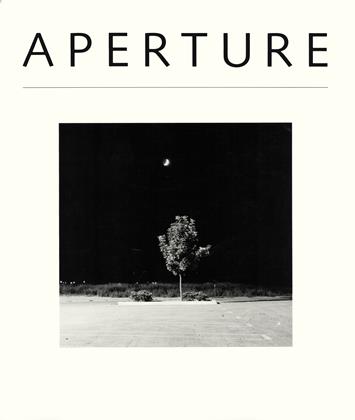Where I Was Meant to Live
Leonardo Sinisgalli
W. S. Di Piero
Mario Giacomelli has been making photographs of the Italian countryside since 1954. The photographs on these pages, from the series Paesaggio, were made from 1955 to 1977. To create his landscapes, Giacomelli manipulates the subject and employs special techniques to produce a graphic image. Using a tractor, he responds to furrows left by farmers in fields and hills by carving earthworks of his own. He photographs the results with a 6 x 8V2 cm. Voigtländer camera, accentuating what he calls his “intervention” with shallow focus, overexposures, and odd camera angles that flatten and distort relationships of scale. Such imperfections as scratches and specks of dust remain visible in his deliberately grainy prints, and the limited tonal range produces stark contrasts of black and white. Some of the photographs were taken from the air; some from mountaintops. All of them express Giacomelli’s passionate relationship to a countryside and people he loves.
THE VALLEY
The mill is buried under the lake with the plum trees, the melons, the pools where trout once took cover. Some say there’s more than darkness down there, that beneath the buried bridge slides the silent vein.
TO MY FATHER
The man returning alone from the vineyard late at night rattles turnips in the tub, turns off the footpath with straw smeared blue green. Fresh loam on his shoes, clean evening odor in his clothes, the man stops by a fountain, talks to the gardener picking fennel. I watch the man, the small man, from a distance. He’s a moving point on the horizon. Maybe tonight his eye will catch fire beside the fishpond where he wipes his forehead.
AUTOBIOGRAPHY IV
My father was a sullen blue green ghost when he returned from the vineyards during the sulfur dusting. He’d separated the vines one by one pulling apart the shoots and bristly leaves. One day he brought home a grub big as his finger that had dropped from an apple tree. “The hard years are over for the Sinisgallis, our sons will have hay to feed a hundred horses,” he said one night to his wife, Queen Taitii, holding her with his two hands, their only embrace before the tribe.
WE WOULD HAVE SEEN
We would have seen the eyes of broadbeans blooming, the wheat opening and, flat on our backs, the fireflies zigzagging on the hay. Our silent trains no longer race through the poplars where we glimpsed them by chance one night: the wind was bending the thistle stems, a plume of smoke was dissolving in your gaze. Our hearts were quick to leave, and our fingers toiled as if the bones had knit. We were tied together by hair, feet and hands, cry and breath, clinging to life with our teeth. What are you thinking now? Who is in your arms? Who will loosen your belt, my love? With your nail you split the red hoods of poppies, then squeeze your small breasts into their stays.
THE DOGS ARE RUNNING MORE SLOWLY
The dogs are running more slowly Around the burnt vine stakes. Orion hangs low These mild evenings at the end of the year. The golden Dipper swings toward this turn. You watch the red moon dawning In the olive grove. The hill is shocked By the sound of the rock crusher. The gravel’s fresh: the wheel Doesn’t crunch where you walk. Lost behind us, childhood Moves farther off, a blind Shadoiv in the dust.
 View Full Issue
View Full Issue
More From This Issue
-

Iran Face To Face
Summer 1982 By Curtis Harnack -

Our Lives And Our Children
Summer 1982 By Robert Adams -

Through Indian Eyes
Summer 1982 By Judith Mara Gutman -

Personal Portraits
Summer 1982 By Nina Raginsky -

Louis Faurer On City Streets
Summer 1982 By Lisa Liebmann -
 People And Ideas
People And IdeasThe Work Of Atget: Old France
Summer 1982 By Jed Perl












